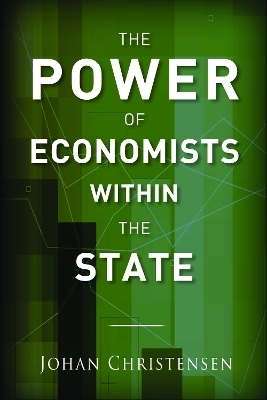
The Power of Economists within the State
Stanford University Press (Verlag)
978-1-5036-0049-2 (ISBN)
Johan Christensen examines one major contributor to this disparity: the entrenchment of U.S.-trained, neoclassical economists in political institutions the world over. While previous studies have highlighted the role of political parties and production regimes, Christensen uses comparative case studies of New Zealand, Ireland, Norway, and Denmark to show how the influence of economists affected the extent to which each nation adopted market-oriented tax policies. He finds that, in countries where economic experts held powerful positions, neoclassical economics broke through with greater force. Drawing on revealing interviews with 80 policy elites, he examines the specific ways in which economists shaped reforms, relying on an activist approach to policymaking and the perceived utility of their science to drive change.
Johan Christensen is Assistant Professor in Leiden University's Institute of Public Administration.
Contents and Abstracts1Economists and Market-Conforming Reform chapter abstractThis chapter presents the theoretical argument of the book, which centers on how the institutionalization of economic knowledge within the state shaped the turn toward the market in public policy. The argument points to the interaction between professional groups and administrative institutions. Highly trained experts often occupy strategic bureaucratic positions and possess knowledge resources that they can leverage vis-à-vis elected politicians. At the same time, the institutional position of professional experts varies across both countries and government organizations, depending not only on functional tasks but also on struggles over the proper role of different forms of knowledge in managing the affairs of the state. The chapter thus puts forward a contingent argument about the institutional role and policy impact of economic experts, which contributes to a growing literature about the role of economists in contemporary policy making.
2The New Economics and Politics of Taxation chapter abstractThis chapter provides an introduction to the changing economics and politics of taxation. It describes the rise and fall of the postwar tax regime and discusses the new economic ideas about taxation that emerged in the 1970s. These new ideas about efficient and neutral taxation were part of the background for the global "tax reform movement" of the 1980s. The chapter surveys the core elements of the tax policy changes adopted worldwide since that time. Yet, importantly, it argues that these general trends conceal great variation in the adoption of market principles in taxation. The chapter traces the diverging tax policy trajectories of four countries that serve as examples of the broader variation in reform: New Zealand, Ireland, Norway, and Denmark.
3New Zealand: Plotting a Market-Oriented Revolution chapter abstractNew Zealand went further in the adoption of market-oriented policies than any other advanced economy in the 1980s. This chapter investigates the role of economists within the state in this radical shift toward the market. It shows how the buildup of economic expertise in the New Zealand Treasury laid the foundations for the embrace of neoclassical economic thinking in the department in the early 1980s, including efficiency-oriented ideas about tax policy. This inspired a radical program of economic restructuring, which was put into action by New Zealand's Labour government. Despite severe criticism and organizational reforms, the sway of state economists over tax policy largely persisted over the following decades, culminating in a further strengthening of the market orientation of the tax system in 2010.
4Ireland: Populist Politics in a Generalist System chapter abstractIn stark contrast to New Zealand's market-conforming policies, Ireland pursued a tax policy of narrow bases and targeted incentives aimed at stimulating specific economic activities. Although successful in fueling economic growth, these policies contributed directly to the country's economic meltdown at the end of the 2000s. This chapter links the policies adopted in Ireland to the country's generalist administrative system. The persistence of generalist, competition-based recruitment to the civil service effectively blocked the rise of economists within the Irish state. The marginal role of economic experts in Ireland's finance bureaucracy not only meant that efficiency-oriented ideas about taxation lacked carriers but also that administrators lacked the analytical skills to resist the increasingly reckless tax policies pursued by politicians.
5Norway: Economic Experts in the Social-Democratic State chapter abstractContrary to conventional notions about social-democratic tax policies, Norway adopted a major market-oriented reform of taxation in the early 1990s. This chapter connects this surprising turn toward market principles to the role of economists within the Norwegian state. Economists were granted a powerful position in the bureaucracy during the Keynesian era. Paradoxically, the close links established between the finance ministry and the economics discipline in this period made the bureaucracy highly receptive to the later shift toward neoclassical economics. New economic ideas were brought into the ministry by U.S-trained economists hired to key positions in the organization. This spurred the formulation and advocacy of a broad efficiency-oriented reform program, which had a major impact on the economic policies enacted by Norwegian governments from the late 1980s onwards.
6Denmark: Equality before Efficiency, Politicians before Experts chapter abstractDenmark stood out in international perspective by maintaining very high top tax rates on labor and high and progressive taxation of capital. This chapter discusses how the organization of economic expertise in Denmark contributed to the limited extent of market-conforming tax reform. Unlike the strong and concentrated position of economists in Norway in the postwar period, economic knowledge in the Danish state was scattered across a number of bodies. A consequence of the institutional fragmentation of economic expertise was that neoclassical economic thinking failed to break through within the Danish finance bureaucracy. This weakened the agenda for efficiency-oriented tax reform and allowed political parties to define the direction for tax policy in the 1990s and 2000s.
7The Power of Economists within the State chapter abstractThe final chapter revisits the overarching argument about the varying power of economists within the state and its impact on the adoption of market-conforming policies. It points out that although economists often played a central role in tax reform processes, their influence depended crucially on the institutionalization of economic knowledge within the state in the postwar period. The chapter also considers what general lessons can be drawn from this analysis and discusses the future prospects for the role of economists in public policy making. Although many studies stress the resilience of economists as providers of market-oriented policies, this conclusion also points to some potential sources of change.
| Erscheinungsdatum | 05.04.2017 |
|---|---|
| Zusatzinfo | 9 figures, 5 tables |
| Verlagsort | Palo Alto |
| Sprache | englisch |
| Maße | 152 x 229 mm |
| Themenwelt | Sachbuch/Ratgeber ► Beruf / Finanzen / Recht / Wirtschaft ► Steuern / Steuererklärung |
| Recht / Steuern ► Steuern / Steuerrecht | |
| Sozialwissenschaften ► Politik / Verwaltung ► Staat / Verwaltung | |
| Sozialwissenschaften ► Soziologie | |
| Wirtschaft ► Volkswirtschaftslehre ► Wirtschaftspolitik | |
| ISBN-10 | 1-5036-0049-1 / 1503600491 |
| ISBN-13 | 978-1-5036-0049-2 / 9781503600492 |
| Zustand | Neuware |
| Haben Sie eine Frage zum Produkt? |
aus dem Bereich


